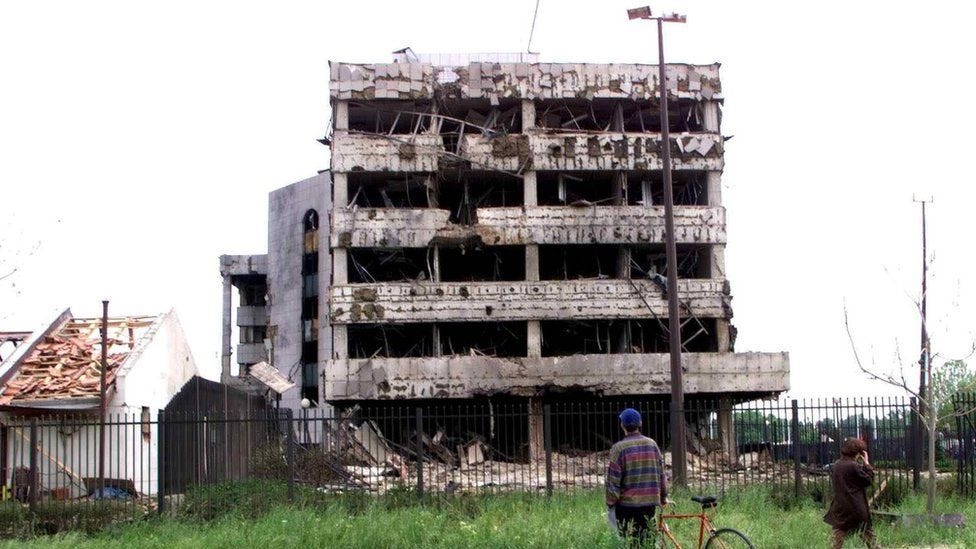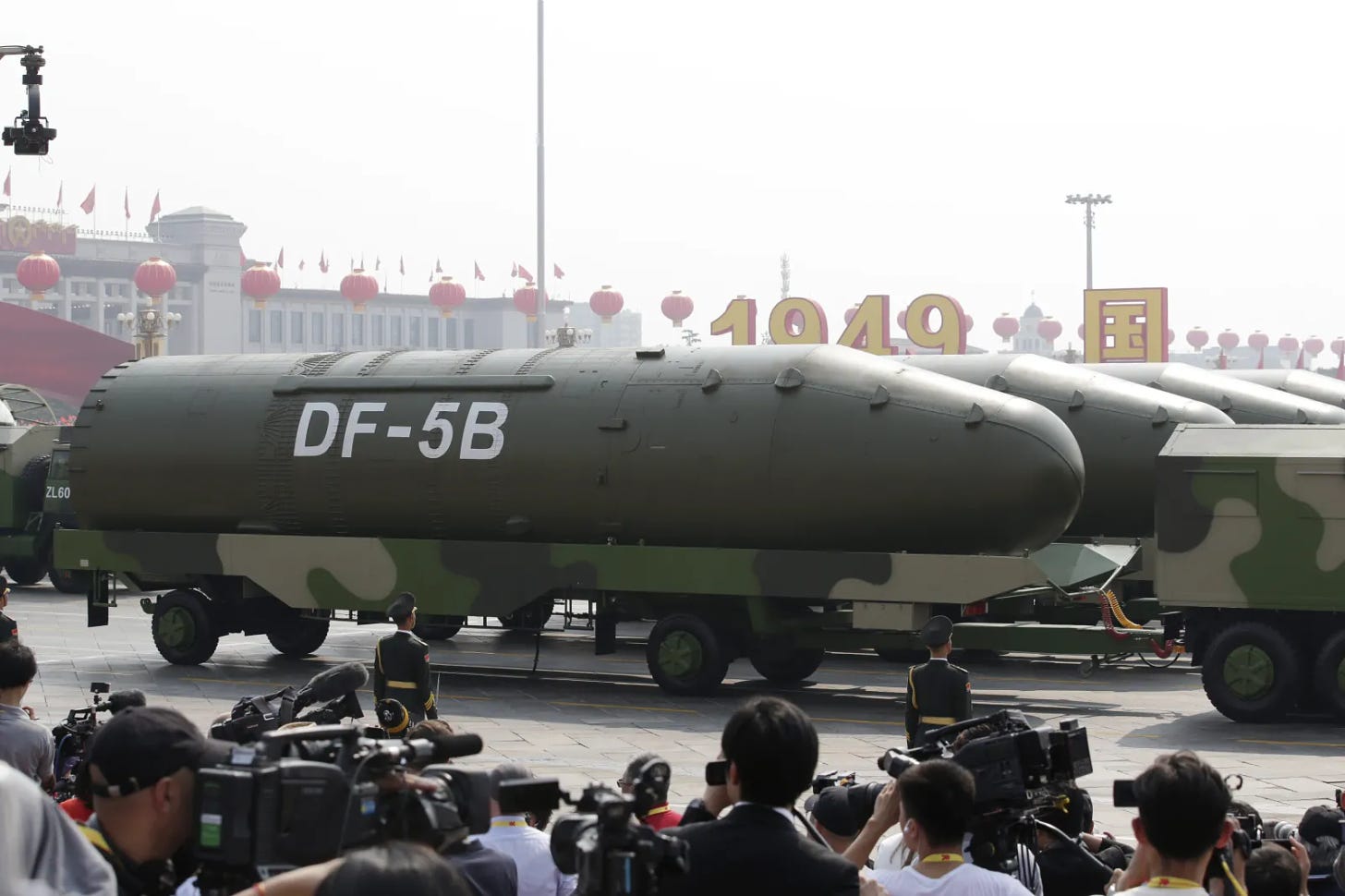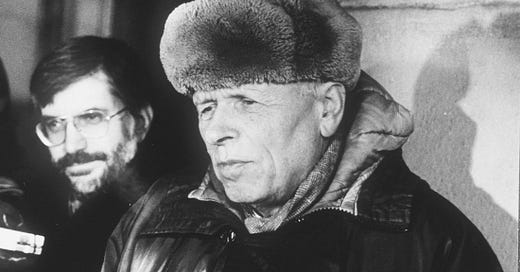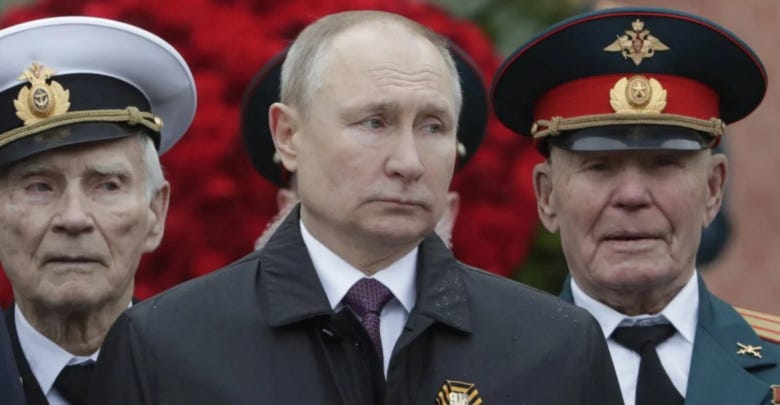Why is China building up its nuclear arsenal?
Why China's history with NATO matters, sympathy for the devil (AKA Putin), and a three-way nuclear arms race?
China has been building up its nuclear arsenal more quickly over the past few years than it has in decades. While it remains significantly smaller than those of the US and Russia, its expansion hasn’t gone unnoticed. If the US starts planning for the worst case scenario - one in which it needs to be able to simultaneously deal with Russian and Chinese nuclear threats - will it too decide to increase its stockpiling?
Is a three-way nuclear arms race between China, the US and Russia inevitable? What does this mean for geopolitics against the backdrop of US-China tensions and the Russian invasion of Ukraine? And can physicists save us all in the end?
Speaking with myself and Schwarzmann Scholar Raven Witherspoon, Tong Zhao (@zhaot2005), a fellow at the Carnegie Center in Beijing who focuses on China’s nuclear program, details Chinese and Russian thinking in the nuclear context, Chinese views on NATO and even offers a glimmer of hope that we aren’t all doomed.
Transcription and editing by Callan Quinn.
ChinaTalk is hiring! I’m looking for 1-2 folks to join Callan and me part-time. Here are google forms to apply for the editorial and business manager positions. Interviews will begin in mid-May.
TheChinaTake: Russia was provoked
Jordan Schneider: What has been most striking to you watching China process and respond to Putin's invasion of Ukraine over the past few weeks?
Tong Zhao: The most striking thing is that China has a fundamentally different perception and understanding of the nature of the war compared to Western countries.
China genuinely believes that Russia was provoked by the United States and Western countries, and therefore forced into taking action.
China sees what it believes to be Western countries uniting together and taking all sorts of illegal measures to not only destabilize Russia but also provoke internal instability with the eventual goal of maybe overthrowing the Russian government and the Russian system.
Given this perception about the nature of the war, it is not surprising that China has taken its current position of refusing to condemn Russia and has shown interest in providing Russia with some economic support. It is even possible that it has been considering military support to Russia as part of its bilateral military cooperation.
The information gap between China and the rest of the world is also very salient. The Chinese people, including Chinese experts, observe different information from that of the Western countries.
One interesting example is the Russian accusation of the US conducting illegal biological weapon research in several labs in Ukraine. The majority of Chinese people, including the majority of Chinese security policy experts, seem to believe those accusations.
So when you have opposite understandings of basic facts, there is no way that China is going to see eye to eye with Western countries about this war and about what they should do together to end this war.
I enjoy putting ChinaTalk together. I hope you find it interesting and am delighted that it goes out free to eight thousand readers.
But, assembling all this material takes a lot of work, and I pay my contributors and editor. Right now, less than 1% of its readers support ChinaTalk financially.
If you appreciate the content, please consider signing up for a paying subscription. You will be supporting the mission of bringing forward analysis driven by Chinese-language sources and elevating the next generation of analysts, all the while earning some priceless karma and access to an ad-free feed!
Jordan Schneider: If the Chinese government has a sincere belief that it was actually all NATO's fault, what are the data points to support that argument?
Tong Zhao: The concern about NATO is longstanding and very deep. I was a student in middle school when NATO mistakenly bombed the Chinese embassy in Belgrade during the Balkan War.
The overwhelming national narrative was very anti-NATO. Everyone was told that NATO was a military alliance that was behaving in a very aggressive way to achieve its hegemonic objectives and that it blatantly violated basic international laws and rules.
That narrative is very deeply embedded. Growing up in this environment, there is no doubt that the majority of Chinese people have had this deep concern about NATO for a very long time. They have therefore been interpreting current contemporary affairs through that lens.

Jordan Schneider: Traditional Chinese foreign policy principles like self-determination and non-interference in the affairs of other countries would lead you to come to a very different conclusion about what’s going on though. Why don’t those narratives hold sway?
Tong Zhao: In this case, I think it is because China believes that Western countries never really respected international laws and principles. We're facing a situation where it's apparent that Western countries are being aggressive and trying to destroy Russia. After that, they will focus their fire on China. China will be their next target.
As such, China has to prioritize preserving its strategic interests, which means helping Russia and maintaining the very important China-Russia strategic partnership.
Jordan Schneider: You made an argument on Twitter that your sense is the Chinese government didn't know the war was going to happen before it started. This seems like something you would want to tell a strategic partner you were going to do before you did it.
First off, why do you think Beijing wasn't aware? And how do you think not being told will impact the way Beijing sees Moscow going forward?
Tong Zhao: The Chinese intelligence community seems to have failed to predict the war. Before the war, mainstream thinking within the Chinese policy community was that Putin was deploying massive troops on the border of Ukraine as a form of military posturing.
Even though he probably had a strong inclination to launch a full-scale war in early February, when he met Xi in Beijing, I don't think he had 100% made that final decision. He was probably waiting to see whether his coercive pressure would achieve his political goals without having to push the button.
But after he left Beijing it became more and more apparent that there would be no concession from the other parties. Then he eventually made the decision.
A history of nuclear China
Jordan Schneider: Let's do a brief history of China's Cold War nuclear development and nuclear policy. How did it evolve?
Tong Zhao: China felt it was threatened with nuclear weapons by the United States during the Korean War and the Taiwan Strait crisis in the 1950s. Chinese leaders also believed that for China to become a respected power it needed nuclear weapons, otherwise Western countries wouldn't listen to China and wouldn’t respect it.
When starting the program in the late 1950s, China received a lot of support from the Soviet Union. But after the China-Soviet relationship deteriorated, China worked on its nuclear program itself.
It successfully detonated its first nuclear bomb in 1964 and continued investing in the program even when the Chinese economy was running into huge difficulties.
The program did receive less funding during periods of economic hardship, but China gradually and incrementally improved its nuclear capability and acquired basic, strategic deterrent capability by the 1980s. In the decades following, and as the economy started to take off, China has constantly invested in the program.
However, all of this changed in the early 2010s.
Jordan Schneider: Before we get to that, how did nuclear weapons evolve doctrinally from the sixties up until the 2010s?
Tong Zhao: Officially there was no change in nuclear doctrine. China's longstanding position is that China's nuclear weapons only aim to achieve one goal, which is to prevent other countries from using nuclear weapons on China. And if deterrence fails, only then would China conduct nuclear retaliation.
The doctrine is also that China should have credible second-strike capability, which means that even if the enemy conducts an overwhelming comprehensive first strike on China, it would still have enough nuclear weapons surviving to retaliate and inflict damage on the enemy.
This would deter the enemy from using or threatening to use nuclear weapons on China in the first place. That has been the long-standing position.
But there is debate among the Chinese expert community about how China should pursue second-strike capability. Some experts believe as long as the enemy can’t be sure if it can destroy the entire Chinese nuclear arsenal and there is a chance of retaliation, that uncertainty would be good enough to deter any nuclear threat.
On the other hand, other experts think that China needs to demonstrate 100% guaranteed retaliation capability. There should be no doubt in the enemy's mind that China can retaliate.
I think this debate is evolving and maybe shifting towards pursuing a more assured second-strike capability, which may explain some of China's recent nuclear modernization efforts.
Raven Witherspoon: China's recent modernization efforts have generated a lot of buzz in international security circles. What are some of the more pertinent developments in the last couple of years? And how has doctrine and rhetoric shifted alongside these changes?
Tong Zhao: Although not official, there is some conjecture about how things might be changing.
China has officially embarked on an effort to develop nuclear triad capability, which means China is pursuing land-based nuclear capabilities, sea-based nuclear capabilities, and airborne nuclear capabilities. This is a departure from China's traditional emphasis on land-based nuclear forces.
China didn’t have airborne capability for decades and only started to develop sea-based nuclear capabilities in recent decades. China appears to be building at least three major silo bases in Northwestern China. Each of these silo bases may have more than one hundred silos and appear to be for the deployment of intercontinental ballistic missiles (ICBMs). This development alone could add hundreds of additional nuclear warheads to China's arsenal.
For decades, it was believed that China had maintained a very small arsenal of about 200 nuclear warheads, so this is a major increase in the Chinese arsenal size and only a part of what China appears to be doing to modernize its nuclear forces.
According to the US Department of Defense assessments, China will add more nuclear strategic submarines to its current fleet in the coming years. It is also developing airborne nuclear capability. The DOD predicts China will develop up to 700 nuclear weapons by 2027 and more than one thousand by the end of this decade. This is a very significant, very quick increase in China’s nuclear arsenal.
There are also signs that China is thinking about developing launch under attack or launch on warning capabilities, meaning that China is acquiring a strategic early warning system and can use this to detect enemy missile launches as soon as they happen. It would then be able to launch early retaliation even before the enemy warheads would do any damage to Chinese territory.
This is a capability that the US and Russia already possess but all of this will be a major change in China's nuclear posture because for decades it has maintained a very modest nuclear posture.
If China is now shifting towards launch on warning or launch under attack, the situation will be more volatile and it may increase the risk of false alarms. It is also reported that China is conducting research into sonic weapon systems that can be nuclear-capable. This is a type of capability that only China is reported to be developing. However, there is no confirmation from China about this and no explanation about why it may be interested in such capabilities.
I think the US and Western countries are worried not only because China is increasing its arsenal and changing its stance, but also because it is unclear what motivations are driving such developments.

Raven Witherspoon: You mentioned in some of your writings that China is not particularly interested in arms control at the moment. With the projections that China could potentially triple its arsenal in the coming years, do you have any thoughts on what the world might look like if China were to seek that kind of numerical parity with the US and Russia?
Tong Zhao: I don't think China is currently seeking nuclear parity with US and Russia. We need to remember that the American and Russian nuclear arsenals are still at least one order of magnitude greater than the Chinese one. It would take China a lot of effort, resources, and money to reach that level.
It's more likely that the Chinese leadership wants to massively increase the arsenal in an open-ended process and will make another evaluation later to understand whether China needs to further expand its arsenal or not. It could be an open-ended process with no final decisions.
That said, given the speed of the Chinese nuclear buildup and the lack of transparency, this could motivate the US to plan for the worst-case scenario. There's already discussion in Washington that it's time to consider the threat of Chinese and Russian nuclear programs simultaneously.
The US nuclear thinking has been preoccupied with the Russian threat with China is a much smaller, secondary consideration, but they may start to plan for a scenario where Russia and China coordinate and present a joint nuclear threat.
In that case, the US may need to readjust its nuclear capabilities and nuclear stance. That will lead to a very destabilizing situation.
If the US believes it has to have the capability to deal with both Chinese and Russian capabilities simultaneously, and China and Russia believe that they also need to be able to independently counter the American nuclear strategy, it's going to be very hard to create a stable situation among the three parties.
But I don't think Russia and China have a deep enough trust to fully incorporate their nuclear capabilities and coordinate their nuclear strategy. Russia and China probably still see their objective as being able to independently deter the US, whereas the US may feel the necessity to deter both Russia and China simultaneously.
Putin: deranged or defensive?
Jordan Schneider: Was there any sort of reaction among the China nuclear experts about Putin’s nuclear warning? Is that at all impacting calculations about how China should think about its nuclear posture going forward?
Tong Zhao: In general, China appears sympathetic to Putin raising the alert levels. China thinks that Putin was raising the nuclear alert level as a deterrent to dissuade NATO and Western countries from providing military support to Ukraine and from further intervening in the war, including by imposing more economic sanctions on Russia.
China interprets Russia’s nuclear signaling from a defensive perspective. It was not particularly alarming for China, whereas in the West there is concern that Putin is becoming deranged: if he's cornered or if he faces major conventional military defeat in Ukraine he could deliberately escalate the war to higher levels, potentially across the nuclear threshold.
In the West, the threat perception of Russian nuclear escalation is more serious, whereas I don't think China fully appreciates the risk of nuclear escalation.
And, by the way, the reason China itself has been building up its nuclear forces in recent years is also that China wants to be able to deter US military intervention in any future conventional conflict over the Taiwan Strait or the South China Sea. So Chinese nuclear thinking is similar to Russia. Greater nuclear capability helps limit the military options of the US and Western countries in a conventional conflict.
There’s also a distinction to be made between tactical and strategic nuclear weapons. A tactical nuclear weapon is a smaller payload directed at winning a position on a battlefield in a particular fight as opposed to strategic nuclear weapons, which aim to blow up entire cities.
There is concern that Putin would consider using these sorts of smaller nuclear weapons as a signaling mechanism. It wouldn't necessarily kill hundreds of thousands of people, but it would show he's willing to go there.
Jordan Schneider: Do you see any potential glimmers of hope on the horizon? Are there any channels of dialogue that are still open?
Tong Zhao: When the two presidents had a virtual summit on 18 November last year, they discussed nuclear weapon issues. At least the Chinese president appeared to acknowledge the importance of having a dialogue on nuclear weapons and strategic stability.
We may be hearing a more substantive proposal from the American side in the near term future. I don't think China has a strong interest in discussing arms control issues, but if the US starts with low-hanging fruits like risk reduction measures, these topics could be the starting point of more serious and long-term dialogue.
At this moment, given what is going on in Ukraine and more urgent issues in the bilateral relationship, nuclear weapons are not receiving a lot of attention. We may have to wait and see what happens and what specific proposals the United States comes up with.
Physicists and Nuclear Policy
Jordan Schneider: So over the past few months, for whatever reason, I've had a lot of physicists on the show. To what extent do you think the mindset that being a physicist trains you in and applying it to questions of international security?
Is there anything that getting more trained physicist as opposed to lawyers making these sorts of decisions going forward could help with?
Tong Zhao: They care more about facts. They want to get to the facts right. Many of the policy experts know very little about the technical aspects of international security issues and they just basing their understanding hearsay. They just listen to what the state media says and believe it.
I think the challenge today is the scientists, the physicists may have their personal views about facts, but because of the overall school environment, they don't feel safe or they can’t speak up. So there's no one there to correct factual errors that are so widespread in the national narrative. That's deeply worrisome.
The stakes are rising, and the risk of a major strategic misunderstanding between China and the west [is increasing]. It's now time for the scientists, for the engineers for the physicists to speak up, to conduct balanced and objective research and to inform their policy experts, colleagues, and to inform the decision makers of what the facts are. Hopefully that will provide some opportunity to contain the serious information gap and a perception gap between the two sides.
Jordan Schneider: Let’s all hope we can get a few more Andrei Sakharovs to save us this century.
Have thoughts, comments or ideas you want to share about this week’s ChinaTalk? Leave your feedback in the comments!
Thanks for reading,
Jordan






Reading about nuclear parody and numerical parody brought to mind the Emily Litella character from Saturday Night live played by Gilda Radner. The word you intended was obviously parity. Yes, you need a proofreader or an editor.
Greeat episode 👌